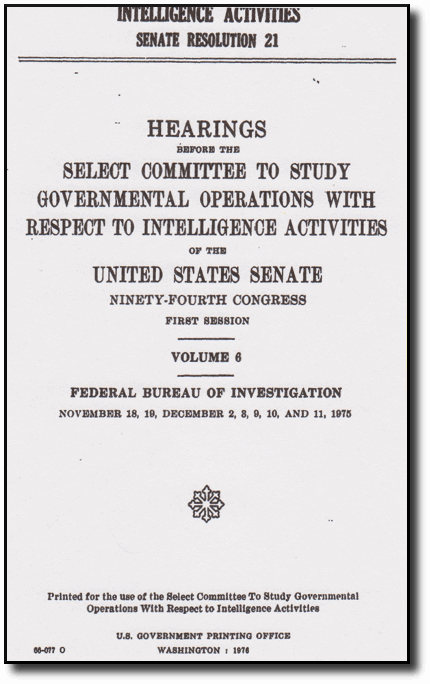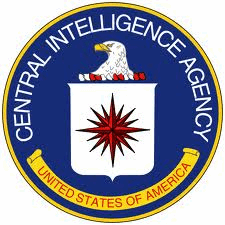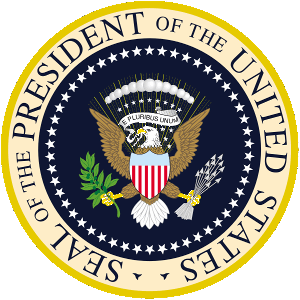Excerpt 1

"None of us can afford to be insensitive to the grave implications of unjustified and unlawful spying by the Government. It poses a very real danger to the personal freedoms which are the cornerstone of our democratic system." 93rd Cong., 1st sess., Congressional Record 119 (September 11, 1973) at 29146.
Excerpt 2

"America was based on the revolutionary concept that the people should decide what is right and what is wrong, what is acceptable and what is not.
That is what we meant by a free government, and our forefathers were convinced that it can exist only through the greatest tolerance of speech and opinion. They place their faith in the people to remain alert to encroachments on their liberty.
The founders of our country knew that the greatest danger to freedom comes from the efforts of government to suppress the opinions of its opponents. They set up a system which limited the powers of government, bound it in the constraints of the law, and prohibited it from infringing on the rights of people to free expression. And through the separation of power, the system of checks and balances, they tried to assure that the Executive would be accountable to the people through the Congress."
U.S. Congress. Senate. Select Committee to Study Governmental Operations with Respect to Intelligence Activities. Intelligence Activities: Senate Resolution 21: Federal Bureau of Investigation. Volume 6. 94th Cong., 1st sess., November 18, 19, December 2, 3, 9, 10, and 11, 1975 at 62.
Excerpt 3

"The resort to clandestine instruments of manipulation, coercion, and interference in the affairs of other countries may have been essential to our security at one time. But over the years, it became increasingly marginal. Today we find it has damaged our credibility, tarnished our prestige and undermined our power in the world." 94th Cong., 1st sess., Congressional Record 121 (October 9, 1975) at 32871.
Excerpt 4
"As chairman of the Subcommittee on Domestic Intelligence of the Select Committee, I have spent the past few months immersed in the evidence of gross abuse of the rights of American citizens by the FBI and other domestic intelligence agencies. The Bureau's "neutralization" of Dr. Martin Luther King is a case in point. Between 1963 and his death in 1968, the FBI placed Dr. King under intensive physical and electronic surveillance, including in sixteen instances installing bugs in Dr. King's hotel rooms. The FBI decided to use the information it had obtained through this electronic surveillance to "dethrone" King, and to cultivate and promote a new leader of the civil rights movement. It used the information to attempt to block Dr. King's being awarded honorary college degrees. The Bureau attempted to block Dr. King's audience with the Pope and to discredit him with other churches and the clergy. It mailed a hotel "bug" tape to King and an enclosed blackmail letter." 94th Cong., 2nd sess., Congressional Record 122 (February 18, 1976) at 3533.
Excerpt 5

"The laws in the Constitution are at times inconvenient, and they were intended to be because they were intended to restrain the unlimited exercise of power by Government. As I read the Secretary of the Defense's [Donald Rumsfeld] letter, he seems to find it inconvenient to come up and report to a newly created committee charged with the oversight of intelligence operations. Sure, it is inconvenient, but in the face of the abuses we have seen, certainly we are warned that that 'inconvenience' argument is puny compared to the risks to American democracy and the need for accountability under the Constitution of the United States and the laws of this land."
U.S. Congress. Senate. Select Committee on Intelligence. Electronic Surveillance Within the United States for Foreign Intelligence Purposes: Hearings Before the Subcommittee on Intelligence and the Rights of Americans. 94th Cong., 2nd sess., April 1, 1976 (in response to Secretary of Defense Donald Rumsfeld's letter to the committee) at 103-104.
Excerpt 6

"A president who is accountable to no one—not the Congress or the courts—is a president who will be tempted to interpret the law for his own convenience, to decide who is an enemy of the state, to violate constitutional protections of our liberties. A system of government cannot operate this way. That defines the imperial presidency, the rise of tyranny, that gave our founders nightmares.
There will always be threats to our national security, and there will always be someone who argues that shortcuts are necessary to keep us safe. But that is no argument to subvert the law. If you want to adapt to new circumstances or new threats, then you amend the law."
Walter Mondale, The Good Fight (New York: Scribner, 2010) at 155.